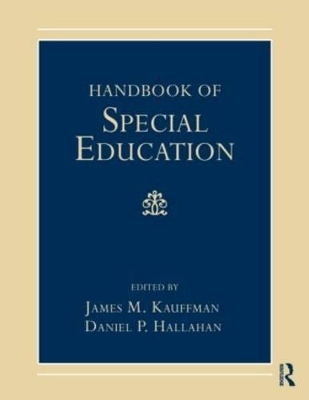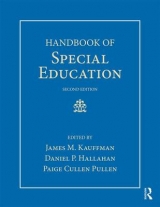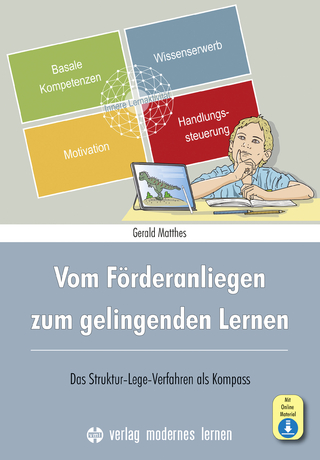
Handbook of Special Education
Routledge (Verlag)
978-0-415-80072-3 (ISBN)
- Titel erscheint in neuer Auflage
- Artikel merken
Comprehensive Coverage—Fifty-seven chapters cover all aspects of special education in the United States including cultural and international comparisons.
Issues & Trends—In addition to synthesizing empirical findings and providing a critical analysis of the status and direction of current research, chapter authors discuss issues related to practice and reflect on trends in thinking.
Categorical Chapters—In order to provide a comprehensive and comparative treatment of the twelve categorical chapters in section IV, chapter authors were asked to follow a consistent outline: Definition, Causal Factors, Identification, Behavioral Characteristics, Assessment, Educational Programming, and Trends and Issues.
Expertise—Edited by two of the most accomplished scholars in special education, chapter authors include a carefully chosen mixture of established and rising young stars in the field.
This book is an appropriate reference volume for anyone (researchers, scholars, graduate students, practitioners, policy makers, and parents) interested in the state of special education today: its research base, current issues and practices, and future trends. It is also appropriate as a textbook for graduate level courses in special education.
James M. Kauffman (Ed.D., University of Kansas) is Professor Emeritus of Education at the Curry School of Education at the University of Virginia. He was the William Clay Parrish Professor of Education from 1992–1994, the Charles S. Robb Professor of Education 1999–2003, and received the Outstanding Faculty Award from the Curry School of Education in 1997. He received the Research Award, Council for Exceptional Children in 1994 and the Outstanding Leadership Award, Council for Children with Behavioral Disorders in 2002. He is the author or co-author of many books, chapters, and articles in special education. Daniel P. Hallahan (Ph.D., University of Michigan) has been the Charles S. Robb Professor of Education at the University of Virginia’s Curry School of Education since 1971. He was the inaugural editor of Exceptionality and serves on the editorial boards of Learning Disabilities Research and Practice, Learning Disability Quarterly, The Journal of Special Education, and Exceptionality. He is a past president of the Division of Learning Disabilities of CEC and in 2000 received the CEC Career Research Award. He is the author or co-author of many books, chapters, and articles in special education.
Preface
I. Historical and Contemporary Issues in Educating Exceptional Learners, Section Editor, James M. Kauffman, University of Virginia
Introduction
1. A History of Special Education, Michael M. Gerber
2. Contemporary Issues, James M. Kauffman, C. Michael Nelson, Richard L. Simpson, & Devery R. Mock
3. Statistics, Data, and Special Educational Decisions: Basic Links to Realities, James M. Kauffman & John Wills Lloyd
4. Designing Rigorous Group Studies in Special Education: Common Understandings of Efficacy, Effectiveness, and Evidence Standards, Lana Santoro, Russell Gersten, & Rebecca A. Newman-Gonchar
5. Special Education and Teacher Preparation, Margo Mastropieri, Tom Scruggs, & Sara Mills
II. Legal Aspects of Special Education, Section Editor, Mitchell L. Yell, University of South Carolina
Introduction
6. The Individuals with Disabilities Education Act: The Evolution of Special Education Law, Mitchell L. Yell, Antonis Katysiannis, & M. Renee Bradley
7. Free Appropriate Public Education, Mitchell L. Yell & Jean B. Crockett
8. Individualized Education Programs for Children with Disabilities, Barbara D. Bateman
9. Least Restrictive Environment, Michael Rozalski, Jason Miller, & Angie Stewart
III. The General Education Context of Special Education, Section Editor, Naomi P. Zigmond, University of Pittsburgh
Introduction
10. Responsiveness to Intervention Models for Reducing Reading Difficulties and Identifying Learning Disability, Rollanda E. O’Connor & Victoria Sanchez
11. Standards-Based Reforms and Students with Disabilities, Martha L. Thurlow & Rachel F. Quenemoen
12. Co-Teaching for Students with Disabilities: A Critical Analysis of the Empirical Literature, Bryan G. Cook, Kimberly A. McDuffie, Linda Oshita, & Sara Cothren Cook
13. General and Special Education Are (and Should Be) Different, Naomi Zigmond & Amanda Kloo
IV. Categorical Issues in Special Education, Section Editors, Daniel P. Hallahan & Paige C. Pullen, University of Virginia
Introduction
14. Intellectual and Developmental Disabilities, Edward A. Polloway, James R. Patton, & Marvalin A. Nelson
15. Learning Disabilities, Paige C. Pullen, Holly B. Lane, Kristen E. Ashworth, & Shelly P. Lovelace
16. Attention-Deficit/Hyperactivity Disorder, Karen J. Rooney
17. Emotional and Behavioral Disorders, Timothy J. Landrum
18. Communication Disorders, Filip Loncke
19. Deaf and Hard of Hearing Students, Jean F. Andrews, Pamela C. Shaw, & Gabriel Lomas
20. Blind and Low Vision, George J. Zimmerman & Kim Zebehazy
21. Traumatic Brain Injury, Renee Lajiness-O'Neill & Laszlo A. Erdodi
22. Current Issues and Trends in the Education of Children and Youth with Autism Spectrum Disorders, Maureen A. Conroy, Janine P. Stichter, & Nicholas Gage
23. Multiple and Severe Disabilities, Susan Bruce
24. Special Gifts and Talents, Carolyn M. Callahan
V. Assessment of Students with Disabilities, Section Editor, Jennifer H. Lindstrom, University of Georgia
Introduction
25. High-Stakes Testing and Accommodations, Jennifer H. Lindstrom
26. Academic Progress Monitoring, Sheri Berkeley & Paul J. Riccomini
VI. Policy and Administration of Special Education, Section Editor, Jean B. Crockett, University of Florida
Introduction
27. Conceptual Models for Leading and Administrating Special Education, Jean B. Crockett
28. Fiscal Policy and Funding for Special Education, Tom Parrish & Jenifer Harr-Robins
29. Using Professional Standards to Inform Leadership in Special Education, Mary Lynn Boscardin
30. Factors Influencing Special Education Teacher Quality and Effectiveness, Bonnie S. Billingsley
VII. Instructional Issues for Students with High Incidence Cognitive Disabilities, Section Editor, John W. Lloyd, University of Virginia
Introduction
31. Reading, Paige C. Pullen & Deanna B. Cash
32. Writing and Students with Disabilities, Steve Graham & Karen R. Harris
33. The Development of Arithmetic and Word-Problem Skill Among Students with Mathematics Disability, Lynn S. Fuchs, Sarah R. Powell, Pamela M. Seethaler, Paul T. Cirino, Jack M. Fletcher, Douglas Fuchs, & Carol L. Hamlett
34. Science and Social Studies, Tom Scruggs, Margo Mastropieri, & Lisa Marshak
35. Physical Education, Luke E. Kelly & Martin C. Block
36. Career and Technical Education, Maureen A. Schloss & Philip L. Gunter
37. Technology and Academic Instruction Considerations for Students with High-Incidence Cognitive Disabilities, Cheryl A. Wissick & J. Emmet Gardner
VIII. Instructional Issues for Students with Low Incidence Cognitive Disabilities, Section Editor, Adelle Renzaglia, University of Illinois
Introduction
38. Educating Students with Significant Cognitive Disabilities: Historical Overview and Future Projections, Fred Spooner & Fredda Brown
39. Systematic Instruction of Students with Severe Disabilities, Erik Drasgow, Mark Wolery, James Halle, & Zahra Hajiaghamohseni
40. Instructional Contexts, John McDonnell
41. Access to General Education Curriculum for Students with Significant Cognitive Disabilities, Mike L. Wehmeyer
42. Preparing Students with Significant Cognitive Disabilities for Life Skills, Stacy K. Dymond
IX. Transition of Adults with High Incidence Disabilities, Section Editor, David J. Scanlon, Boston College
Introduction
43. Transition to Post Secondary Education, Joseph W. Madaus & Manju Banerjee
44. Choice Patterns and Behaviors of Work-Bound Youth with High Incidence Disabilities, Jay W. Rojewski & Noel Gregg
45. Transition to Independent Living, David Scanlon, Jim Patton, & Marshall Raskind
X. Transition of Adults with Low Incidence Disabilities, Section Editor, M. Sherril Moon, University of Maryland
Introduction
46. Preparing Students with Low Incidence Disabilities to Work in the Community, Katherine J. Inge & M. Sherril Moon
47. Preparing Students with Low-Incidence Disabilities for Community Living Opportunities, Jane M. Everson & Meghan H. Trowbridge
XI. Parent and Family Issues in Special Education, Section Editor, George H. S. Singer, University of California at Santa Barbara
Introduction
48. Parent Organizations, H. Rutherford Turnbull, III, Karrie Shogren, & Ann P. Turnbull
49. Resilience in Families of Children with Disabilities: Risk and Protective Factors, George Singer, Christine Maul, Mian Wang, & Brandy Ethridge
50. Promoting Family Outcomes in Early Intervention, Don B. Bailey, Jr., Melissa Raspa, Betsy P. Humphreys, & Ann M. Sam
XII. Early Identification and Intervention in Exceptionality, Section Editor, Maureen A. Conroy, Virginia Commonwealth University
Introduction
51. Advances in Theory, Assessment and Intervention with Infants and Toddlers with Disabilities, Carl J. Dunst
52. Early Intervention and Prevention of Disability: Preschoolers, Kathleen Marshall, William H. Brown, Maureen A. Conroy, & Herman Knopf
53. Frameworks for Guiding Program Focus and Practices in Early Intervention, Patricia A. Snyder, Tara W. McLaughlin, & Maria K. Denney
54. Early Identification and Intervention in Gifted Education: Developing Talent in Diverse Learners, Catherine M. Brighton & Jane M. Jarvis
XIII. Cultural and International Issues in Special Education, Section Editor, Dimitris Anastasiou, University of Western Macedonia
Introduction
55. Ethnicity and Exceptionality, Dimitris Anastasiou, Ralph Gardner, III, & Domna Michail
56. Gender and Exceptionality, Martha J. Coutinho & Donald P. Oswald
57. International Differences in Provision for Exceptional Learners, Dimitris Anastasiou & Clayton Keller
| Erscheint lt. Verlag | 12.5.2011 |
|---|---|
| Zusatzinfo | Following Hbk Ed Policy Research; 62 Tables, black and white |
| Verlagsort | London |
| Sprache | englisch |
| Maße | 216 x 279 mm |
| Gewicht | 2404 g |
| Themenwelt | Sozialwissenschaften ► Pädagogik ► Sonder-, Heil- und Förderpädagogik |
| ISBN-10 | 0-415-80072-2 / 0415800722 |
| ISBN-13 | 978-0-415-80072-3 / 9780415800723 |
| Zustand | Neuware |
| Informationen gemäß Produktsicherheitsverordnung (GPSR) | |
| Haben Sie eine Frage zum Produkt? |
aus dem Bereich



